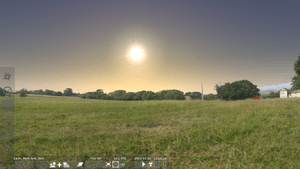Stellarium (computer program)
|
| |
 | |
| Original author(s) | Fabien Chéreau |
|---|---|
| Developer(s) | Stellarium development team |
| Initial release | 2001 |
| Stable release | 0.12.4 / 28 September 2013 |
| Written in | C++ (Qt) |
| Operating system | Linux, Windows, Mac OS X |
| Platform | PC |
| Size |
77.9 MB (Linux tarball) 35 MB (Debian package) 77.2 MB (Windows installer) 60.7 MB (Mac OS X package) |
| Type | Educational software |
| License | GNU GPL |
| Website | www.stellarium.org |
Stellarium is a free software planetarium, licensed under the terms of the GNU General Public License, available for Linux, Windows, and Mac OS X. It uses OpenGL to render a realistic projection of the night sky in real time.
Stellarium was developed by the French programmer Fabien Chéreau, who launched the project in the summer of 2001. Other developers include Robert Spearman, Johannes Gajdosik, Matthew Gates, Nigel Kerr, and Johan Meuris, who is responsible for the artwork.
Stellarium was featured on SourceForge in May 2006 as Project of the Month.[1]
History
In 2006, Stellarium 0.7.1 won a gold award in the Education category of the Les Trophées du Libre free software competition.[2]
A modified version of Stellarium has been used by the MeerKAT project as a virtual sky display showing where the antennae of the radiotelescope are pointed.[3]
In December 2011, Stellarium was added as one of the "featured applications" in the Ubuntu Software Center.[4]
Features
- Sky feature
- Over 600,000 stars from the Hipparcos Catalogue and the Tycho-2 Catalogue
- Extra catalogues with more than 210 million stars
- Asterisms and illustrations of the constellations
- Constellations from ten cultures
- Images of nebulae (full Messier catalogue)
- Realistic Milky Way
- Realistic atmosphere, sunrise and sunset
- Planets of the solar system and their major moons
- Ability to display stars and other celestial objects as seen from reference points other than the Earth (e.g. Saturn, Phobos, comet C/2006 P1 (McNaught) or any other object defined in ssystem.ini)
- Interface
- Zoom
- Time control
- Multilingual interface
- Scripting to record and playback shows
- Fisheye projection for planetarium domes
- Spheric mirror projection for personal domes
- Graphical interface and extensive keyboard control
- Telescope control
- Visualization
- Equatorial and azimuthal grids
- Star twinkling
- Shooting stars
- Eclipse simulation
- Skinnable landscapes
- Spherical panorama projection
- Customisability
- Deep sky objects, landscapes, constellation images, scripts etc. can be added.
Planetarium dome projection
The fisheye and spherical mirror distortion features allow Stellarium to be projected onto domes. Spherical mirror distortion is used in projection systems that utilize a digital video projector and a first surface convex spherical mirror to project images onto a dome. Such systems are generally cheaper than traditional planetarium projectors and fish-eye lens projectors and for that reason are used in budget and home planetarium setups where projection quality is less important. Several companies that build and sell digital planetarium systems use Stellarium, such as e-Planetarium.[5]
VirGO
VirGO is a Stellarium plugin, a visual browser for the European Southern Observatory (ESO) Science Archive Facility that allows astronomers to browse professional astronomical data. It is no longer supported or maintained, apparently the last version is 1.4.5, dated Jan 15th 2010.[6]
Screenshots
-

Constellation art in version 0.6.2
-

Stellarium for Java (a Java fork), version 0.8.2
-

Version 0.8.0, interface in German
-

Version 0.9.0, interface in Greek
-

Constellation art in version 0.10.1
See also
References
- ↑ "Project of the Month - May 2006 - Stellarium". SourceForge. May 2006. Retrieved 2008-09-25.
- ↑ "The third Free Software Awards placed under the sign of the international". Les Trophées du Libre 2006 website. Retrieved 2009-02-16.
- ↑ "Virtual sky display in MeerKAT control room". Ska.ac.za. Retrieved 2012-06-16.
- ↑ "Software Centre app picks for December | Ubuntu App Developer". Developer.ubuntu.com. 2011-12-14. Retrieved 2012-06-16.
- ↑ "Stellarium Planetarium Software". E-Planetarium website. Retrieved 2009-02-15.
- ↑ "VirGO, The Visual Archive Browser". ESO Science Archive Facility. Retrieved 2012-11-21.
External links
| Wikimedia Commons has media related to Stellarium. |